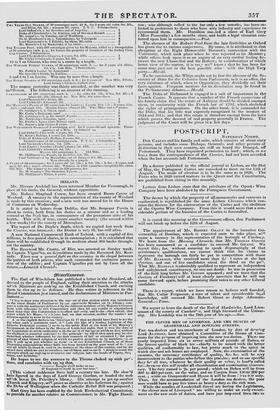idt clTan r a u
The Earl of Winchilsea has published a letter in the Standard, ad- dressed to the people of England, calling their attention to the attacks which Ministers are making on the Established Church, and exciting 'them to rise up in its defence. Be thus writes in reference to the Royal Commission just issued, and the declarations of Ministers in Par- liament-...
" I beg to draw your attention to the nor-art of that motion which was introduced In the lower House of Parliancsit by t.ie ..onovsaide Member tor St. Albans ; com- pare it with the sentiments delivered by the diKerent members of Ids Majesty's (;ovein- ment with refeience to this Commission and then let any candid or unprejudiced mind deny that this Commission is to erect •ectly, and to the .allest extent, that Object which his Majes....os r lt:sers had, on that occasion, neither the canduer nor firmness openly to avow to the country.
A .er the explicit declartuion (Grac:ods Gc 1! that we should have lived to see the
day when such a sentiment coot.. Lom the lips of a leading legislator of this hitherto l'rutestant country!) msde by the noble Earl at the head of his Majesty's Government, in the debate in the House of LOWS last night, that it was the duty of our Legislature to act in conformity a :th the sp•-it of the age in which we live, without the slightest or remotest refer-nee ta the principle ^ by which thst spirit may be elm. racterized, whether influenced by the dark counsels of hel' or animated 1../ the pure precept of that blessed religion of which we profe.s ouiseives to be membeis,—a...er this, I call (Iran you, whether as mead -Is of our Established Church, or of those Dissenting conglegations whose faith has been founded on the pure word of 0. 1 ow and all boldly to stand fo. yard in (he defence or the altais of this country, and by the sacred duty which we one to oursclu•s, our children, and to our G 1, firmly to resist the attempts which are mat :ng to sertender our religion into the hands of Popery, Seek ticisni, and Inidelity."
He hopes to see the avenues to the Throne choked up with pe**- bons, and concludes with sa}:ng that,
Nought shall make us rue If England to itself do rest but true."
[This siolent nobleman lives half a century too late. He shorld have figured in the days of Lord George Gorden, or headed the mob -wh.ch buiat Dr. Priestley's library. His attempt to get up another Church and King cry, will prove as abortive as his ludicrous fur.; against the Deice of Wellington when the Catholic Relief Bill was proposed.] Earl Grey has been enabled by the Irish Ecclesiastical Commission, to provide for another relative as Commissioner, in Mr. Tighe klamil-
ton ; who although called to the bar only a few months, has been se- lected in preference to those who have only industry and experience to recommend them. Mr. Hamilton mar.ied a niece of Earl Grey (Miss Ponsonby) a few months since, and holds a legal situation con- ferred upon him in consequence.—Post.
The absence of Sir Robert Peel from the late festivities at Oxford has given rise to various conjectures. By some, it is attributed to that abruption of the Right Honopnible Baronet's connection with the University, which took place when he was rejected as its Member ; while others look upon it as an augury of no very cordial feeling be- tween the new Chancellor and Sir Robert ; in corroboration of which latter view of the matter, it is veli we knots .1 that he has been for some time past not in the best possible odor- with the High Tory party.—Herald.
To be consistent, the Whigs ought not to fear the absence of the Se- cretary of State for the Colonies from Parliament, as it is an office, the very existence of which, when in Opposition, they decidedly set their faces against. Frequent motions for its dissolution may be found in the Peiiiamentary debates.—Ileruld.
The Duke of Richmond is engaged in a suit of importance in the French Courts. It appears that a number of the French connesions of his family claim that the estate of Aubigny should be divided amongst them, in conformity with the French law of 1792, which abolished the rights of primogeniture. On the other hand, it is contended for the Duke, that his title was expressly recognized in the treaties of 1814 and 1815; and that this estate is therefore exempt from the laws which govern the descent of real property generally in France. The judgment of the Court will be given in a few days.


















 Previous page
Previous page